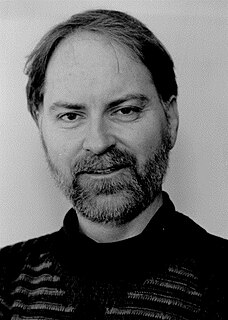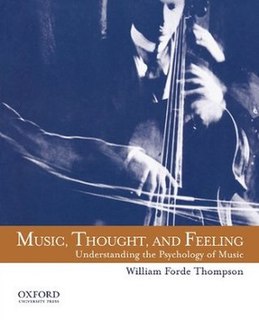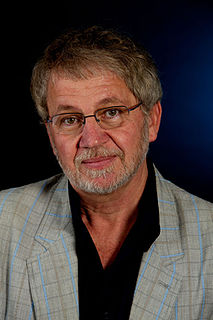
Maurice Jean Jacques Merleau-Ponty was a French phenomenological philosopher, strongly influenced by Edmund Husserl and Martin Heidegger. The constitution of meaning in human experience was his main interest and he wrote on perception, art, politics, religion, biology, psychology, psychoanalysis, language, nature, and history. He was the lead editor of Les Temps modernes, the leftist magazine he established with Jean-Paul Sartre and Simone de Beauvoir in 1945.

Cognition refers to "the mental action or process of acquiring knowledge and understanding through thought, experience, and the senses". It encompasses all aspects of intellectual functions and processes such as: perception, attention, thought, intelligence, the formation of knowledge, memory and working memory, judgment and evaluation, reasoning and computation, problem solving and decision making, comprehension and production of language. Imagination is also a cognitive process, it is considered as such because it involves thinking about possibilities. Cognitive processes use existing knowledge and discover new knowledge.

Stevan Robert Harnad is a Hungarian-born cognitive scientist based in Montreal, Canada.

Music psychology, or the psychology of music, may be regarded as a branch of both psychology and musicology. It aims to explain and understand musical behaviour and experience, including the processes through which music is perceived, created, responded to, and incorporated into everyday life. Modern music psychology is primarily empirical; its knowledge tends to advance on the basis of interpretations of data collected by systematic observation of and interaction with human participants. Music psychology is a field of research with practical relevance for many areas, including music performance, composition, education, criticism, and therapy, as well as investigations of human attitude, skill, performance, intelligence, creativity, and social behavior.
John Anthony Sloboda OBE FBA is Research Professor at the Guildhall School of Music and Drama where he currently leads research on the Social Impact of Making Music. He is also one of the founders of the Iraq Body Count project.

Shaun Gallagher is an American philosopher known for his work on embodied cognition, social cognition, agency and the philosophy of psychopathology. Since 2011 he has held the Lillian and Morrie Moss Chair of Excellence in Philosophy at the University of Memphis and was awarded the Anneliese Maier Research Award by the Humboldt Foundation (2012–2018). Since 2014 he has been Professorial Fellow at the University of Wollongong in Australia. He has held visiting positions at Keble College, Oxford; Humboldt University, Berlin; Ruhr Universität, Bochum; Husserl Archives, ENS (Paris); École Normale Supérieure, Lyon; University of Copenhagen; and the Cognition and Brain Sciences Unit, Cambridge University. He is also known for his philosophical notes on the effects of solitary confinement.

Palgrave Macmillan is a British academic and trade publishing company headquartered in the London Borough of Camden. Its programme includes textbooks, journals, monographs, professional and reference works in print and online. It maintains offices in London, New York, Shanghai, Melbourne, Sydney, Hong Kong, Delhi, and Johannesburg.
Enactivism is a position in cognitive science that argues that cognition arises through a dynamic interaction between an acting organism and its environment. It claims that the environment of an organism is brought about, or enacted, by the active exercise of that organism's sensorimotor processes. "The key point, then, is that the species brings forth and specifies its own domain of problems ...this domain does not exist "out there" in an environment that acts as a landing pad for organisms that somehow drop or parachute into the world. Instead, living beings and their environments stand in relation to each other through mutual specification or codetermination". "Organisms do not passively receive information from their environments, which they then translate into internal representations. Natural cognitive systems...participate in the generation of meaning ...engaging in transformational and not merely informational interactions: they enact a world." These authors suggest that the increasing emphasis upon enactive terminology presages a new era in thinking about cognitive science. How the actions involved in enactivism relate to age-old questions about free will remains a topic of active debate.
Christopher Darren Green is professor of psychology at York University in Toronto, Ontario, Canada. He has been cross-appointed to the graduate philosophy and science and technology studies programs as well. His research mostly pertains to the history of psychology, though he also writes on methodological and statistical issues in psychology.

Peter Carruthers is a British-American philosopher and cognitive scientist working primarily in the area of philosophy of mind, though he has also made contributions to philosophy of language and ethics. He is a Professor of Philosophy at the University of Maryland, College Park, an associate member of Neuroscience and Cognitive Science Program, and a member of the Committee for Philosophy and the Sciences.
Kim Sterelny is an Australian philosopher and professor of philosophy in the Research School of Social Sciences at Australian National University and Victoria University of Wellington. He is the winner of several international prizes in the philosophy of science, and was previously editor of Biology and Philosophy. He is also a member of the Australian Academy of the Humanities. He is currently the First Vice President of the Division for Logic, Methodology and Philosophy of Science and Technology of the International Union of History and Philosophy of Science and Technology (2020–2023).

François Grosjean is a Professor Emeritus and former Director of the Language and Speech Processing Laboratory at the University of Neuchâtel (Switzerland). His specialty is psycholinguistics and his domains of interest are the perception, comprehension and production of language, be it speech or sign language, in monolinguals and bilinguals. He also has interests in biculturalism, applied linguistics, aphasia, sign language, and natural language processing. He is better known for his work on bilingualism in which he has investigated the holistic view of bilingualism, language mode, the complementarity principle, and the processing of code-switching and borrowing. In one of his most-cited papers, Grosjean argues that hearing-impaired children have the right to grow up bilingual, learning two languages—namely, sign language and oral language.

Music, Thought, and Feeling: Understanding the Psychology of Music is a book written by psychologist William Forde Thompson and published in 2009 by Oxford University Press. The 2nd edition was published in 2014.

Steven L. Neuberg is an experimental social psychologist whose research has contributed to topics pertaining to person perception, impression formation, stereotyping, prejudice, self-fulfilling prophecies, stereotype threat, and prosocial behavior. His research can be broadly characterized as exploring the ways motives and goals shape social thought processes; extending this approach, his later work employs the adaptationist logic of evolutionary psychology to inform the study of social cognition and social behavior. Neuberg has published over sixty scholarly articles and chapters, and has co-authored a multi-edition social psychology textbook with his colleagues Douglas Kenrick and Robert Cialdini.

Gualtiero Piccinini is an Italian–American philosopher known for his work on the nature of mind and computation as well as on how to integrate psychology and neuroscience. He is Curators' Distinguished Professor in the Philosophy Department and Associate Director of the Center for Neurodynamics at the University of Missouri, St. Louis.

Joseph Paul Forgas is an Australian social psychologist, currently Scientia Professor at the University of New South Wales, Sydney, Australia. He was born in Budapest, Hungary and emigrated to Australia at the age of 22. He is married with two children, and lives in Sydney's Eastern Suburbs.
Cognitive biology is an emerging science that regards natural cognition as a biological function. It is based on the theoretical assumption that every organism—whether a single cell or multicellular—is continually engaged in systematic acts of cognition coupled with intentional behaviors, i.e., a sensory-motor coupling. That is to say, if an organism can sense stimuli in its environment and respond accordingly, it is cognitive. Any explanation of how natural cognition may manifest in an organism is constrained by the biological conditions in which its genes survive from one generation to the next. And since by Darwinian theory the species of every organism is evolving from a common root, three further elements of cognitive biology are required: (i) the study of cognition in one species of organism is useful, through contrast and comparison, to the study of another species’ cognitive abilities; (ii) it is useful to proceed from organisms with simpler to those with more complex cognitive systems, and (iii) the greater the number and variety of species studied in this regard, the more we understand the nature of cognition.

David Huron is a Canadian Arts and Humanities Distinguished Professor at the Ohio State University, in both the School of Music and the Center for Cognitive and Brain Sciences. His teaching and publications focus on the psychology of music and music cognition. In 2017, Huron was awarded the Society for Music Perception and Cognition Achievement Award.
Lola L. Cuddy is a Canadian psychologist recognized for her contributions to the field of music psychology. She is a professor emerita in the Department of Psychology at Queen's University in Kingston, Ontario.












